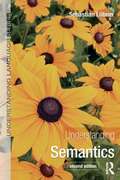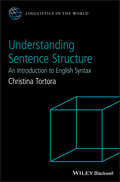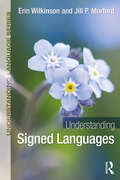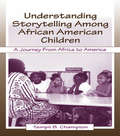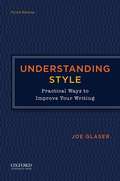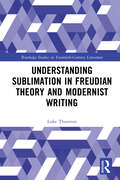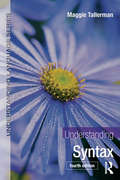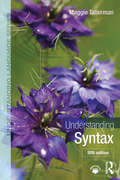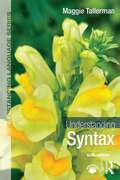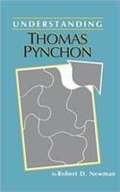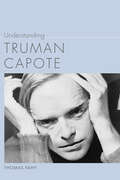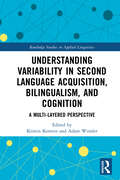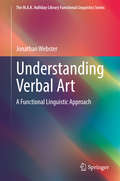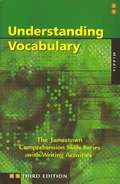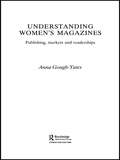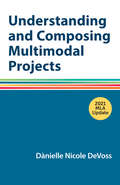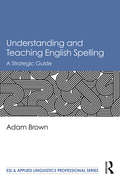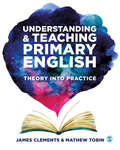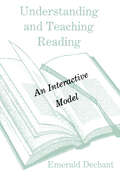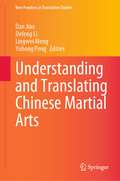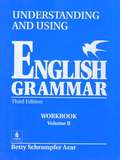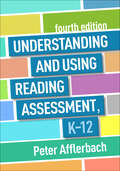- Table View
- List View
Understanding Semantics, Second Edition (Understanding Language)
by Sebastian LoebnerUnderstanding Semantics, Second Edition, provides an engaging and accessible introduction to linguistic semantics. The first part takes the reader through a step-by-step guide to the main phenomena and notions of semantics, covering levels and dimensions of meaning, ambiguity, meaning and context, logical relations and meaning relations, the basics of noun semantics, verb semantics and sentence semantics. The second part provides a critical introduction to the basic notions of the three major theoretical approaches to meaning: structuralism, cognitive semantics and formal semantics. Key features include: A consistent mentalist perspective on meaning Broad coverage of lexical and sentence semantics, including three new chapters discussing deixis, NP semantics, presuppositions, verb semantics and frames Examples from a wider range of languages that include German, Japanese, Spanish and Russian. Practical exercises on linguistic data Companion website including all figures and tables from the book, an online dictionary, answers to the exercises and useful links at routledge.com/cw/loebner This book is an essential resource for all undergraduate students studying semantics. Sebastian Löbner is a Professor of Linguistics at the Institute for Language and Information at the University of Düsseldorf, Germany
Understanding Sentence Structure: An Introduction to English Syntax (Linguistics in the World)
by Christina TortoraA straightforward guide to understanding English grammar This book is for people who have never thought about syntax, and who don't know anything about grammar, but who want to learn. Assuming a blank slate on the part of the reader, the book treats English grammar as a product of the speaker's mind, and builds up student skills by exploring phrases and sentences with more and more complexity, as the chapters proceed. This practical guide excites and empowers readers by guiding them step by step through each chapter with intermittent exercises. In order to capitalize on the reader's confidence as a personal authority on English, Understanding Sentence Structure assumes an inclusive definition of English, taking dialect variation and structures common amongst millions of English speakers to be a fact of natural language. Situates grammar as part of what the student already unconsciously knows Presupposes no prior instruction, not even in prescriptive grammar Begins analyzing sentences immediately, with the “big picture” (sentences have structure, structure can be ambiguous) and moves through levels of complexity, tapping into students’ tacit knowledge of sentence structure Includes exercise boxes for in-chapter practicing of skills, side notes that offer further tips/encouragement on topics being discussed, and new terms defined immediately and helpfully in term boxes Applies decades of findings in syntactic theory and cognitive science, with an eye towards making English grammar accessible to school teachers and beginning students alike Understanding Sentence Structure: An Introduction to English Syntax is an ideal book for undergraduates studying modern English grammar and for instructors teaching introductory courses in English grammar, syntax, and sentence structure.
Understanding Signed Languages (Understanding Language)
by Jill P. Morford Erin WilkinsonUnderstanding Signed Languages provides a broad and accessible introduction to the science of language, with evidence drawn from signed languages around the world. Readers will learn about language through a unique set of signed language studies that will surprise them with the diversity of ways human languages achieve the same functional goals of communication. Designed for students with no prior knowledge of signed languages or linguistics, this book features: A comprehensive introduction to the sub-fields of linguistics, including sociolinguistics, linguistic structure, language change, language acquisition, and bilingualism; Examples from more than 50 of the world’s signed languages and a brief “Language in Community” snapshot in each chapter highlighting one signed language and the researchers who are documenting it; Opportunities to reflect on how language ideologies have shaped scientific inquiry and contributed to linguistic bias; Review and discussion questions, useful websites, and pointers to additional readings and resources at the end of each chapter. Understanding Signed Languages provides instructors with a primary or secondary text to enliven the discourse in introductory classes in linguistics, interpreting, deaf education, disability studies, cognitive science, human diversity, and communication sciences and disorders. Students will develop an appreciation for the language-specific and universal characteristics of signed languages and the global communities in which they emerge.
Understanding Storytelling Among African American Children: A Journey From Africa To America
by Tempii B. ChampionUnderstanding Storytelling Among African American Children: A Journey From Africa to America reports research on narrative production among African American children for the purpose of extending previous inquiry and discussion of narrative structure. Some researchers have focused on the influence of culture on the narrative structures employed by African American children; some have suggested that their narrative structures are strongly influenced by home culture; others posit that African American children, like children in general, produce narrative structures typically found in school settings. Dr. Champion contributes to previous research by suggesting that African American children do not produce one structure of narratives exclusively, but rather a repertoire of structures, some linked to African and African American, and others to European American narrative structures. Detailed analyses of narratives using both psychological text analysis and qualitative analysis are presented. An informative introduction provides background for the study, including a history of storytelling within the African American community. Part I offers a framework for understanding narrative structures among African American children. In Part II, evidence is presented that African American children produce a repertoire of narrative structures that are complex in nature. Part III connects the research findings to implications for educating African American children. Researchers, students, and professionals in the fields of literacy education, language development, African American studies, and communication sciences and disorders will find this book particularly relevant and useful.
Understanding Style: Practical Ways to Improve Your Writing
by Joe GlaserAuthor Joe Glaser explains and illustrates measurable, non-subjective keys to good writing--an approach that yields practical writing techniques and advice rarely found elsewhere. <P><P>An excellent choice for courses in advanced composition, this book also covers more standard topics such as economy, diction, coherence, and variety--along with abundant open-ended exercises drawn from business, history, popular science, and other area.
Understanding Sublimation in Freudian Theory and Modernist Writing (Routledge Studies in Twentieth-Century Literature)
by Luke ThurstonWhat is at stake in Freud’s enduring preoccupation with a process supposedly diverting sexuality into cultural activity? In this study, a leading scholar of psychoanalysis and literature re-opens the old question of sublimation in a critical reading that explores one of the last remaining puzzles of Freudian thought. Using the rigorous framework provided by Jean Laplanche, Luke Thurston resituates sublimation as an unfinished Freudian concept bound up with a much wider history of philosophical and literary reflection. Exploring the misunderstanding and reinvention of sublimation both in accounts of cultural history and in Lacan’s celebrated reading of Antigone, Thurston challenges some of the prevalent assumptions still seen in contemporary “theory.” Thurston links his critical investigation of psychoanalysis to modernist literature, discovering both parallels and alternatives to Freud’s idea of sublimation in little-known works by May Sinclair and David Jones. The study concludes by arguing that these modernist artists, both of whom were significantly affected by trauma during the First World War, produced work radically at odds with the established canons of representation, and that this “anti-hermeneutic” art can be linked to a “Copernican” sublimation, a process not controlled by the ego but vitalizing it and decentring its habitual structure.
Understanding Syntax (Understanding Language)
by Maggie TallermanAssuming no prior knowledge, Understanding Syntax illustrates the major concepts, categories and terminology associated with the study of cross-linguistic syntax. A theory-neutral and descriptive viewpoint is taken throughout. Starting with an overview of what syntax is, the book moves on to an explanation of word classes (such as noun, verb, adjective) and then to a discussion of sentence structure in the world's languages. Grammatical constructions and relationships between words in a clause are explained and thoroughly illustrated, including grammatical relations such as subject and object; function-changing processes such as the passive and antipassive; case and agreement processes, including both ergative and accusative alignments; verb serialization; head-marking and dependent-marking grammars; configurational and non-configurational languages; questions and relative clauses. The final chapter explains and illustrates the principles involved in writing a brief syntactic sketch of a language, enabling the reader to construct a grammatical sketch of a language known to them. Data from approximately 100 languages appears in the text, with languages representing widely differing geographical areas and distinct language families. The book will be essential for courses in cross-linguistic syntax, language typology, and linguistic fieldwork, as well as for basic syntactic description.
Understanding Syntax (Understanding Language)
by Maggie TallermanAssuming no prior grammatical knowledge, Understanding Syntax explains and illustrates the major concepts, categories and terminology involved in the study of cross-linguistic syntax. Taking a theory-neutral and descriptive viewpoint throughout, this book: introduces syntactic typology, syntactic description and the major typological categories found in the languages of the world; clarifies with examples grammatical constructions and relationships between words in a clause, including word classes and their syntactic properties; grammatical relations such as subject and object; case and agreement processes; passives; questions and relative clauses; features in-text and chapter-end exercises to extend the reader’s knowledge of syntactic concepts and argumentation, drawing on data from over 100 languages; highlights the principles involved in writing a brief syntactic sketch of language. This fifth edition has been revised and updated to include extended exercises in all chapters, updated further readings, and more extensive checklists for students. Accompanying e-resources have also been updated to include hints for instructors and additional links to further reading. Understanding Syntax is an essential textbook for students studying the description of language, cross-linguistic syntax, language typology and linguistic fieldwork.
Understanding Syntax (Understanding Language)
by Maggie TallermanAssuming no prior grammatical knowledge, Understanding Syntax explains and illustrates the major concepts, categories and terminology involved in the study of cross-linguistic syntax. Taking a largely theory-neutral and descriptive viewpoint throughout, this book: introduces syntactic typology, syntactic description and the major typological categories found in the languages of the world clarifies with examples grammatical constructions and relationships between words in a clause, including word classes and their syntactic properties; grammatical relations such as subject and object; case and agreement processes; passives and other valency-changing processes; questions and relative clauses features in-text and chapter-end exercises to extend the reader’s knowledge of syntactic concepts and argumentation, drawing on data from over 100 languages highlights the principles involved in writing a brief syntactic sketch of language This sixth edition has been revised to include updated further readings, improved examples and exercises and additional explanations of the most demanding concepts.Understanding Syntax is an essential textbook for students studying the description of language, cross-linguistic syntax, language typology and linguistic fieldwork, and will be the foundation for all studies of theoretical syntax.
Understanding Thomas Pynchon
by Robert D. NewmanThis book introduces the works of Pynchon to both students and general readers alike, and it provides an analysis that will help them to understand the literary aspects of his works.
Understanding Tolkien and The Lord of the Rings
by William ReadyAfter interviewing Tolkien for hours, the author has produced a readable, understandable introduction to Tolkien and his epic trilogy.
Understanding Truman Capote (Understanding Contemporary American Literature)
by Thomas FahyA new direction for Capote studies that reconsiders the author's place in literary criticism, the canon, and the classroomTruman Capote—along with his most famous works In Cold Blood and Breakfast at Tiffany's—continues to have a powerful hold over the American popular imagination. His glamorous lifestyle, which included hobnobbing with the rich and famous and frequenting the most elite nightclubs in Manhattan, makes him the subject of ongoing interest for public and academic audiences alike. In Understanding Truman Capote, Thomas Fahy provides a new direction for Capote studies that offers a way to reconsider the author's place in literary criticism, the canon, and the classroom.By reading Capote's work in its historical context, Fahy reveals the politics shaping his writing and refutes any notion of Capote as disconnected from the political. Instead this study positions him as a writer deeply engaged with the social anxieties of the 1940s and 1950s. Understanding Truman Capote also applies a highly interdisciplinary framework to the author's writing that includes discussions of McCarthyism, the Lavender Scare, automobile culture, juvenile delinquency, suburbia, Beat culture, the early civil rights movement, female sexuality as embodied by celebrities such as Marilyn Monroe, and atomic age anxieties. This new approach to Capote studies will be of interest in the fields of literature, history, film, suburban studies, sociology, gender/sexuality studies, African American literary studies, and American and cultural studies.Capote's writing captures the isolation, marginalization, and persecution of those who deviated from or failed to achieve white middle-class ideals and highlights the artificiality of mainstream idealizations about American culture. His work reveals the deleterious consequences of nostalgia, the insidious impact of suppression, the dangers of Cold War propaganda, and the importance of equal rights. Ultimately Capote's writing reflects a critical engagement with American culture that challenges us to rethink our understanding of the 1940s and 1950s.
Understanding Variability in Second Language Acquisition, Bilingualism, and Cognition: A Multi-Layered Perspective (Routledge Studies in Applied Linguistics)
by Kristin Kersten Adam WinslerThis collection brings together linguistic, psychological, and sociological perspectives reflecting on the relationships and interactions of the multilayered factors impacting second language development and cognitive competence. The book advocates a system approach as a counterpoint to existing scholarship, which has tended to focus on a small set of variables. The 13 chapters demonstrate the ways in which cognitive and linguistic development are intrinsically linked, occurring within a nested structure of multiple levels: individual neuro-cognitive systems and processes, individual engagement with the social world, and the wider social and institutional environments and cultural contexts affecting the belief systems and linguistic conventions of social groups. The volume begins by outlining the theoretical and methodological foundations before moving into a more focused look at the interplay of these different variables at the macro, meso, and micro levels. A final section features two commentary chapters from linguistics and psychology, respectively, synthesizing insights from earlier chapters and situating the collection within broader scholarship on linguistic and cognitive development, theoretical and methodological implications, and discussions of avenues for future empirical research. This book will be of particular interest to scholars in second language acquisition, psycholinguistics, cognition, psychology, and sociology.
Understanding Variability in Second Language Acquisition, Bilingualism, and Cognition: A Multi-Layered Perspective (Routledge Studies in Applied Linguistics)
by Kristin Kersten Adam WinslerThis collection brings together linguistic, psychological, and sociological perspectives reflecting on the relationships and interactions of the multilayered factors impacting second language development and cognitive competence. The book advocates a system approach as a counterpoint to existing scholarship, which has tended to focus on a small set of variables. The 13 chapters demonstrate the ways in which cognitive and linguistic development are intrinsically linked, occurring within a nested structure of multiple levels: individual neuro-cognitive systems and processes, individual engagement with the social world, and the wider social and institutional environments and cultural contexts affecting the belief systems and linguistic conventions of social groups. The volume begins by outlining the theoretical and methodological foundations before moving into a more focused look at the interplay of these different variables at the macro, meso, and micro levels. A final section features two commentary chapters from linguistics and psychology, respectively, synthesizing insights from earlier chapters and situating the collection within broader scholarship on linguistic and cognitive development, theoretical and methodological implications, and discussions of avenues for future empirical research.This book will be of particular interest to scholars in second language acquisition, psycholinguistics, cognition, psychology, and sociology.
Understanding Verbal Art
by Jonathan WebsterThis book applies linguistic analysis to the poetry of Emeritus Professor Edwin Thumboo, a Singaporean poet and leading figure in Commonwealth literature. The work explores how the poet combines grammar and metaphor to make meaning, making the reader aware of the linguistic resources developed by Thumboo as the basis for his unique technique. The author approaches the poems from a functional linguistic perspective, investigating the multiple layers of meaning and metaphor which go into producing these highly textured, grammatically intricate works of verbal art. The approach is based on Systematic Functional Theory, which assists with investigating how the poet uses language (grammar) to craft his text, in a playful way that reflects a love of the language. The multilingual and multicultural experiences of the poet are seen to have contributed to his uniquely creative use of language. This work demonstrates how Systematic Functional Theory, with its emphasis on exploring the semogenic (meaning-making) power of language, provides the handle we need to better understand poetic works as intentional acts of meaning. The verbal art of Edwin Thumboo illustrate Barthes' point that "Bits of code, formulae, rhythmic models, fragments of social languages, etc. pass into the text and are redistributed within it, for there is always language before and around the text. " With a focus on meaning, this functional analysis of poetry offers an insightful look at the linguistic basis of Edwin Thumboo's poetic technique. The work will appeal to scholars with an interest in linguistic analysis and poetry from the Commonwealth and new literatures, and it is also well suited to support courses on literary stylistics or text linguistics.
Understanding Vocabulary (The Jamestown Comprehension Skills Series)
by McGraw-Hill Education Editors McGraw-Hill Education Staff Jamestown PublishersThe Comprehension Skills Series teaches students to become stronger, efficient readers by developing ten important, specific reading comprehension skills.
Understanding Women's Magazines: Publishing, Markets and Readerships in Late-Twentieth Century Britain
by Anna Gough-YatesUnderstanding Women's Magazines investigates the changing landscape of women's magazines. Anna Gough-Yates focuses on the successes, failures and shifting fortunes of a number of magazines including Elle, Marie Claire, Cosmopolitan, Frank, New Woman and Red and considers the dramatic developments that have taken place in women's magazine publishing in the last two decades.Understanding Women's Magazines examines the transformation in the production, advertising and marketing practices of women's magazines. Arguing that these changes were driven by political and economic shifts, commercial cultures and the need to get closer to the reader, the book shows how this has led to an increased focus on consumer lifestyles and attempts by publishers to identify and target a 'new woman'.
Understanding and Composing Multimodal Projects with 2021 MLA Update: A Hacker Handbooks Supplement
by Diana Hacker Nancy SommersThis ebook has been updated to provide you with the latest guidance on documenting sources in MLA style and follows the guidelines set forth in the MLA Handbook, 9th edition (April 2021).
Understanding and Teaching English Spelling: A Strategic Guide (ESL & Applied Linguistics Professional Series)
by Adam BrownConcise and engaging, this text provides pre-service and practicing English language teachers with the knowledge they need to successfully teach the spelling of English. Offering context and explanation for the English spelling system as well as uniquely addressing specific problems in learning the spelling of English words, this book empowers readers with strategies for coping with these problems. Divided into six accessible sections, Brown covers the history of English spelling, the influence of technology on spelling, the role of punctuation, the features of present-day English spelling, teaching strategies for coping with difficult spelling, and the future of spelling and literacy. The short, digestible chapters include practical learning objectives and end-of-chapter exercises to help teachers understand and explain English spelling concepts.
Understanding and Teaching Primary English: Theory Into Practice
by James Clements Mathew TobinInspiring and supporting you to become an insightful, creative and professional teacher of primary English. Teaching children English is an opportunity to give them skills that will enrich their entire lives and is a crucial part of their intellectual development. Covering all major aspects of primary English and following the foundations set in the early years, this book takes you through your teacher training and into your early career in the classroom. Each topic explores what we know from theory and the latest research, and then demonstrates how you can use this understanding in practice. Drawing on the authors’ own knowledge and experiences in the classroom, the book is full of practical advice and strategies to support your own teaching, while also helping you develop your subject knowledge. Key topics include: · Reading and writing in the early years · Curriculum design and planning · Promotive reading for pleasure and teachers as readers · Teaching writing and its role as a form of communication · Vocabulary development and word knowledge · Assessment for formative and summative purposes · Oracy and spoken language development
Understanding and Teaching Primary English: Theory Into Practice
by James Clements Mathew TobinInspiring and supporting you to become an insightful, creative and professional teacher of primary English. Teaching children English is an opportunity to give them skills that will enrich their entire lives and is a crucial part of their intellectual development. Covering all major aspects of primary English and following the foundations set in the early years, this book takes you through your teacher training and into your early career in the classroom. Each topic explores what we know from theory and the latest research, and then demonstrates how you can use this understanding in practice. Drawing on the authors’ own knowledge and experiences in the classroom, the book is full of practical advice and strategies to support your own teaching, while also helping you develop your subject knowledge. Key topics include: · Reading and writing in the early years · Curriculum design and planning · Promotive reading for pleasure and teachers as readers · Teaching writing and its role as a form of communication · Vocabulary development and word knowledge · Assessment for formative and summative purposes · Oracy and spoken language development
Understanding and Teaching Reading: An Interactive Model
by Emerald DechantIn the words of Aldous Huxley, "Every man who knows how to read has it in his power to magnify himself, to multiply the ways in which he exists, to make his life full, significant and interesting." Few people question the value of reading; in fact, most extol its virtues. As our culture becomes more complex, reading plays an increasingly greater role in satisfying personal needs and in promoting social awareness and growth. In the last 20 years, the teaching of this invaluable skill has focused so intensely on comprehension and prediction from context that it has lost sight of the significance of automaticity and fluency in the word-identification process. Reading is a synthesis of word recognition and comprehension; thus, this text is about these basic processes and their integration. A common plea from teachers today is that research and psychology be translated into teaching behavior. Therefore, the aim of this book is twofold: one, to identify, report, organize, and discuss those bits of data, research and theory that are most relevant to the teacher's understanding of the reading process; and two, to help educators to interpret and apply theory and research data to everyday classroom teaching, as well as to the problems encountered frequently in developmental and remedial teaching.
Understanding and Translating Chinese Martial Arts (New Frontiers in Translation Studies)
by Defeng Li Dan Jiao Lingwei Meng Yuhong PengThe present book features some introductory discussions on martial arts for the international audience and highlights in brief the complexities of translating the genre into English, often from a comparative literature perspective. Martial arts, also known as Kungfu or Wushu, refer to different families of Chinese fighting styles over many centuries. Martial arts fiction, or Wuxia literature, is a unique genre that depicts adventures of martial artists in ancient China. Understanding martial arts and the Chinese culture and philosophy behind them creates an intriguing experience, particularly, for non-Chinese readers; translating the literature into English poses unparalleled challenges for translators not only because of the culture embedded in it but also the fascinating martial arts moves and captivating names of many characters therein.
Understanding and Using English Grammar, Third Edition Workbook-Volume B
by Betty Schrampfer AzarA classic developmental skills text for intermediate to advanced students of English, "Understanding and Using English Grammar" is a comprehensive reference grammar as well as a stimulating and teachable classroom text.
Understanding and Using Reading Assessment, K-12
by Peter AfflerbachWell established as a teaching resource and course text, this guide to the "whats," "how-tos," and "whys" of reading assessment is now in a thoroughly revised fourth edition. Peter Afflerbach succinctly introduces major types of assessments, including formative and summative performance assessments, teacher questioning, and high-stakes testing. He provides an innovative framework (the CURRV model) for evaluating the suitability of assessments and combining them effectively to meet all students' needs. Emphasis is given to assessing core reading skills and strategies as well as noncognitive and social–emotional aspects of reading development. Helpful features include detailed examples of assessment done well, within-chapter "Enhance Your Understanding" questions and activities, and 25 reproducible and downloadable checklists and forms. New to This Edition *Explains assessment in a science-of-reading context. *Increased focus on equity issues, plus updated theory and research throughout. *Chapter on assessing early reading. *Chapter on assessing digital and critical reading.
